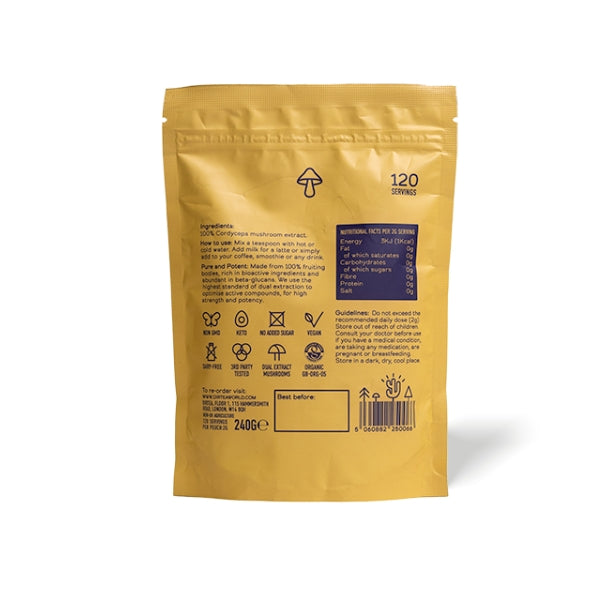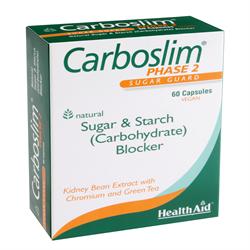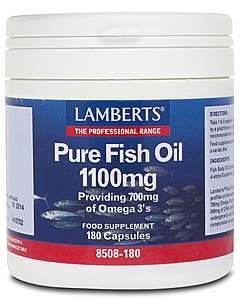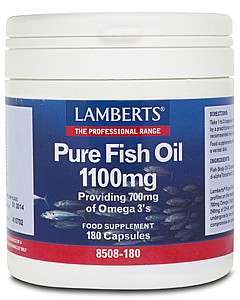Lamberts Pure Fish Oil 1100mg 180 Capsules
Lamberts Pure Fish Oil 1100mg 180 Capsules contain concentrated Fish Oil which provide a full 700mg of Omega 3’s per capsule (many 1000mg fish oil products contain just 350mg of Omega 3’s). This means that Lamberts Pure Fish Oil is one of the strongest available products in the UK and is therefore widely recommended by practitioners.
- 180 capsules.
- Aids brain development.
- A full 360mg EPA & 240mg DHA.
- Widely recommended by practitioners.
- Helps maintain general health & wellbeing.
- One of the strongest available fish oil products.
- Provides a full 700mg of Omega 3's per capsule.
- Includes vitamin E to protect fish oil from oxidation.
- Levels of contaminants well below the strict EU maximum limits.
Also available in smaller sizes:
Lamberts Pure Fish Oil 1100mg 120 Capsules and Lamberts Pure Fish Oil 1100mg 60 Capsules.
Lamberts ensure that their fish oil undergoes a purification process that largely removes odour and reduces levels of contaminants below the strict EU maximum limits. The oil is then protected from oxidation while it is in the capsules by the inclusion of natural Vitamin E. The most beneficial ingredients in fish oil are the two Omega 3 Essential Fatty Acids, EPA (Eicosapentaenoic acid) and DHA (Docosahexaenoic acid). Research has shown that Omegas 3’s play a vitally important part in maintaining our health and wellbeing. The DoH (Department of Health) recommends that people should consume two portions of oily Fish per week to obtain sufficient Omega 3’s. Despite this valuable advice, it is one that is followed by relatively few people, and so the use of fish oil Supplements is the best option for many.
What is omega 3 good for?
Omega-3's play an important role in a range of vital blood processes, from regulating Blood Pressure and blood clotting to boosting immunity. They may be useful for preventing or treating many diseases and disorders. Fish oil supplements are not necessary for heart disease prevention or treatment if you eat oily fish at least twice a week. However, supplements are recommended for rheumatoid arthritis and other inflammatory conditions.
A recent study involving 120 kids in County Durham found that supplements of omega-3's can help to improve the reading and writing abilities and concentration of children with learning difficulties.
The fat in fish contains a class of polyunsaturated fatty acid called omega-3's. These fatty acids differ from the polyunsaturated fatty acids found in vegetable oils, called omega-6's, and have different effects on the body. (Fish do not manufacture such fats but obtain them from the plankton they eat; the colder the water, the more omega-3's the plankton contains). The two most potent forms of omega-3's - eicosapentaenoic acid (EPA) and docosahexanoic acid (DHA) - are found in abundance in cold water fish such as salmon, trout, mackerel and tuna. The sources of third type of omega-3, alpha-linolenic acid (ALA), are certain vegetable oils (such as flaxseed oil) and leafy greens (such as purslane). However, ALA may not be as effective as EPA and DHA; this is still being researched.
Directions of Use
Take 1 to 3 Lamberts Pure Fish Oil Capsules daily with a meal, or as directed by a practitioner or pharmacist.
Disintegration Time: Less than 30 minutes.
Caution:
- Keep away from children.
- Do not exceed the recommended daily dose.
- Food supplements should not be a substitute for a varied diet.
Storage:
Lamberts Pure Fish Oil Capsules should be stored in a cool dry place and protected from light.
Ingredients
A soft capsule.
Each capsule delivers:
Fish Body Oil Concentrate 1100mg.
Providing Omega 3 fatty acids 700mg.
Of which:
Eicosapentaenoic Acid (EPA) 360mg.
Docosahexaenoic Acid (DHA) 240mg.
Encapsulated With:
Capsule shell (Gelatin and Glycerin), Antioxidant: d alpha Tocopherol.
Allergen advice:
Contains fish.
The following list of allergens are excluded: Wheat, Barley, Soya, Eggs, Milk (and milk products), Lactose, Nuts, Sulphites, Celery, Yeast and Gluten containing ingredients.






